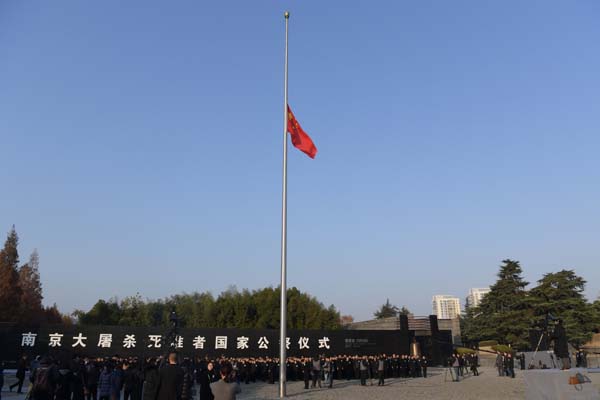Safety zone of 1937 massacre revisited

The ceremony for the National Memorial Day for Nanjing Massacre Victims is held at the memorial hall for the massacre victims in Nanjing, Jiangsu province, on Dec 13. [Photo/Xinhua]
Over 300 Chinese citizens and foreigners revisited the safety zone, which saved the lives of many Nanjing locals 82 years ago, paying tribute to international friends who offered a helping hand in the darkest hours and spread the voice of peace to the world.
They started at the Suiyuan Campus of Nanjing Normal University, where the asylum of the then Jinling Women's Arts and Science College was located. The demilitarized safety zone for Chinese civilians spanned from the western parts of the city from Nanjing University to the city's northern gates, including the American embassy and various Chinese buildings.
Proposed by foreigners residing in Nanjing and managed by German businessman John Rabe, the zone was set up on the eve of the Japanese capture of Nanjing, then China's capital, on Dec 13, 1937. It saved the lives of many thousands of Chinese civilians during the six-week campaign of slaughter, when more than 300,000 Chinese civilians and unarmed soldiers were killed and over 20,000 women were raped.
Ge Daorong, a 93-year-old survivor, placed a scarf on the sculpture of Minnie Vautrin, a heroic teacher who helped set up the safety zone and bravely stood up against violence, leading to the saving of 10,000 lives.
Ge said he was grateful to Vautrin for saving his life and her kindheartedness will be remembered by generations to come.
Huang Kunming, a member of the Political Bureau of the Communist Party of China Central Committee and head of the Publicity Department of the CPC Central Committee, gave a brief speech to commemorate the victims and cherish peace on Dec 13.
"Today we held the national memorial ceremony to pay tribute to the history of the Chinese People's War of Resistance Against Japanese Aggression and to commemorate Nanjing Massacre victims and all compatriots who were killed by the Japanese aggressors-the martyrs and national heroes who gave their lives for victory in the war of resistance-and to remember the international friends who gave their lives to help the Chinese people fight against the Japanese."


 Dynamic Decade: Jiangsu recounts amazing achievements in education
Dynamic Decade: Jiangsu recounts amazing achievements in education
